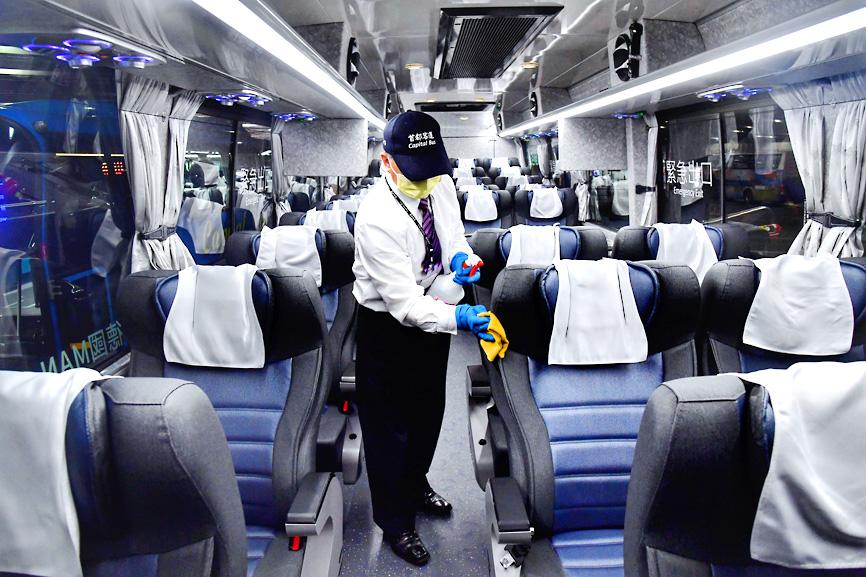The Ministry of Transportation and Communications (MOTC) yesterday announced that it would expand a subsidy program to include highway bus operators, who have lost a substantial number of passengers as the nation tightened its disease-prevention measures to contain the COVID-19 pandemic.
Minister of Transportation and Communications Lin Chia-lung (林佳龍) made the announcement during an inspection at the Taipei City Hall Bus Station to see how bus operators have been enforcing the government’s disease-prevention measures.
The nation should thank and support bus operators for having fulfilled their corporate responsibility by guarding the first line of defense in the mass transportation system, Lin said.

Photo: CNA
While the ministry has ensured that bus operators receive masks and alcohol disinfectant to help combat the spread of the disease, the operators went further by starting to take the temperature of passengers as soon as the disease spread to the nation, he said.
There has been no confirmed case of a person contracting the coronavirus from taking a bus, he added.
Bus operators’ disease-prevention efforts have helped people in the nation to live a relatively normal life, compared with those living in other parts of the world affected by the pandemic, Lin said.
“Taiwan is now recognized by countries around the globe for its success in curbing the spread of the coronavirus, which is a result of collective efforts. We have to do everything we can to keep it that way until everything returns to normal,” he said.
Lin said that freeway bus operators have seen their passenger numbers drop by more than 90 percent, while highway bus operators have lost about 40 percent of their passengers.
Inner-city buses experienced smaller losses, as commuters still need to take the bus for work and other practical purposes, he said.
Rather than waiting for funds from the government’s special budget for businesses affected by the pandemic, Lin said that the Directorate-General of Highways has subsidized 280 airport shuttle buses since March 19, when the nation started restricting the arrival and departure of international passengers, with each bus receiving a monthly subsidy of NT$10,000 (US$332) for three months consecutively.
The subsidy program would be further expanded to include highway bus operators to cover 3,500 buses operating on 186 routes, Lin said.
The highway agency has also stipulated the criteria whereby the subsides would be administered, he added.
Bus routes that have lost more than 50 percent of their passengers would receive a monthly subsidy of NT$30,000 per bus, while those that have seen a decline of 30 to 50 percent would receive a monthly subsidy of NT$20,000 per bus.
Bus routes whose passenger volume has declined 20 to 30 percent would receive a monthly subsidy of NT$10,000 per bus.
Bus operators would receive subsidies for three months consecutively.
The budget for the subsidy program would be about NT$230 million, Lin said.
Five airport shuttle bus operators have also seen their passenger numbers decline 95.6 percent since March 19, compared with the same period last year, statistics provided by the bus operators showed.
Bus operators in Taipei and New Taipei City have lost 70 percent and 90 percent of their passengers respectively, while those based in Taoyuan’s Jhungli District (中壢), Hsinchu, Taichung and Yilan County’s Luodong Township (羅東) have seen their passengers decrease 99 percent, the statistics showed.

The brilliant blue waters, thick foliage and bucolic atmosphere on this seemingly idyllic archipelago deep in the Pacific Ocean belie the key role it now plays in a titanic geopolitical struggle. Palau is again on the front line as China, and the US and its allies prepare their forces in an intensifying contest for control over the Asia-Pacific region. The democratic nation of just 17,000 people hosts US-controlled airstrips and soon-to-be-completed radar installations that the US military describes as “critical” to monitoring vast swathes of water and airspace. It is also a key piece of the second island chain, a string of

A magnitude 5.9 earthquake that struck about 33km off the coast of Hualien City was the "main shock" in a series of quakes in the area, with aftershocks expected over the next three days, the Central Weather Administration (CWA) said yesterday. Prior to the magnitude 5.9 quake shaking most of Taiwan at 6:53pm yesterday, six other earthquakes stronger than a magnitude of 4, starting with a magnitude 5.5 quake at 6:09pm, occurred in the area. CWA Seismological Center Director Wu Chien-fu (吳健富) confirmed that the quakes were all part of the same series and that the magnitude 5.5 temblor was

Taiwan will now have four additional national holidays after the Legislative Yuan passed an amendment today, which also made Labor Day a national holiday for all sectors. The Chinese Nationalist Party (KMT) and Taiwan People’s Party (TPP) used their majority in the Legislative Yuan to pass the amendment to the Act on Implementing Memorial Days and State Holidays (紀念日及節日實施辦法), which the parties jointly proposed, in its third and final reading today. The legislature passed the bill to amend the act, which is currently enforced administratively, raising it to the legal level. The new legislation recognizes Confucius’ birthday on Sept. 28, the

The Central Weather Administration has issued a heat alert for southeastern Taiwan, warning of temperatures as high as 36°C today, while alerting some coastal areas of strong winds later in the day. Kaohsiung’s Neimen District (內門) and Pingtung County’s Neipu Township (內埔) are under an orange heat alert, which warns of temperatures as high as 36°C for three consecutive days, the CWA said, citing southwest winds. The heat would also extend to Tainan’s Nansi (楠西) and Yujing (玉井) districts, as well as Pingtung’s Gaoshu (高樹), Yanpu (鹽埔) and Majia (瑪家) townships, it said, forecasting highs of up to 36°C in those areas